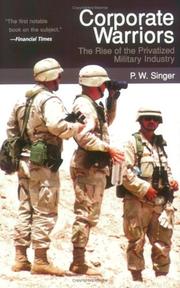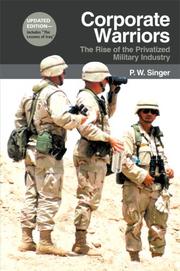| Listing 1 - 2 of 2 |
Sort by
|

ISBN: 0801489156 0801441145 9780801441141 9780801489150 0801459893 0801474361 1336208139 Year: 2004 Publisher: Ithaca (N.Y.) : Cornell university press,
Abstract | Keywords | Export | Availability | Bookmark
 Loading...
Loading...Choose an application
- Reference Manager
- EndNote
- RefWorks (Direct export to RefWorks)
Some have claimed that "War is too important to be left to the generals," but P. W. Singer asks "What about the business executives?" Breaking out of the guns-for-hire mold of traditional mercenaries, corporations now sell skills and services that until recently only state militaries possessed. Their products range from trained commando teams to strategic advice from generals. This new "Privatized Military Industry" encompasses hundreds of companies, thousands of employees, and billions of dollars in revenue. Whether as proxies or suppliers, such firms have participated in wars in Africa, Asia, the Balkans, and Latin America. More recently, they have become a key element in U.S. military operations. Private corporations working for profit now sway the course of national and international conflict, but the consequences have been little explored.In Corporate Warriors, Singer provides the first account of the military services industry and its broader implications. Corporate Warriors includes a description of how the business works, as well as portraits of each of the basic types of companies: military providers that offer troops for tactical operations; military consultants that supply expert advice and training; and military support companies that sell logistics, intelligence, and engineering.This updated edition of Singer's already classic account of the military services industry and its broader implications describes the continuing importance of that industry in the Iraq War. This conflict has amply borne out Singer's argument that the privatization of warfare allows startling new capabilities and efficiencies in the ways that war is carried out. At the same time, however, Singer finds that the introduction of the profit motive onto the battlefield raises troubling questions-for democracy, for ethics, for management, for human rights, and for national security.
Defense industries --- Military-industrial complex --- Privatization --- huurlingenorganisatie --- 35.078 --- 328.182:355 --- -Military-industrial complex --- -35.078 --- 855.2 Private actoren --- Industrial-military complex --- Armaments industries --- Arms sales --- Military sales --- Military supplies industry --- Munitions --- Sale of military equipment --- Vormen van overheidsbemoeing. Opheffing van overheidstussenkomst. Privatisering --- Militairindustrieel complex. Oorlogsindustrie als pressie. Military-industrial complex --- 328.182:355 Militairindustrieel complex. Oorlogsindustrie als pressie. Military-industrial complex --- 35.078 Vormen van overheidsbemoeing. Opheffing van overheidstussenkomst. Privatisering --- Industries --- Arms transfers --- United States --- Military policy. --- Polemology --- Defense industries - United States --- Military-industrial complex - United States --- Privatization - United States --- United States of America --- Defense industries. --- Military-industrial complex. --- Privatization.

ISBN: 0801459893 9780801459894 0801474361 9780801474361 Year: 2008 Publisher: Ithaca, N.Y. Cornell University Press
Abstract | Keywords | Export | Availability | Bookmark
 Loading...
Loading...Choose an application
- Reference Manager
- EndNote
- RefWorks (Direct export to RefWorks)
Some have claimed that "War is too important to be left to the generals," but P. W. Singer asks "What about the business executives?" Breaking out of the guns-for-hire mold of traditional mercenaries, corporations now sell skills and services that until recently only state militaries possessed. Their products range from trained commando teams to strategic advice from generals. This new "Privatized Military Industry" encompasses hundreds of companies, thousands of employees, and billions of dollars in revenue. Whether as proxies or suppliers, such firms have participated in wars in Africa, Asia, the Balkans, and Latin America. More recently, they have become a key element in U.S. military operations. Private corporations working for profit now sway the course of national and international conflict, but the consequences have been little explored.In Corporate Warriors, Singer provides the first account of the military services industry and its broader implications. Corporate Warriors includes a description of how the business works, as well as portraits of each of the basic types of companies: military providers that offer troops for tactical operations; military consultants that supply expert advice and training; and military support companies that sell logistics, intelligence, and engineering.This updated edition of Singer's already classic account of the military services industry and its broader implications describes the continuing importance of that industry in the Iraq War. This conflict has amply borne out Singer's argument that the privatization of warfare allows startling new capabilities and efficiencies in the ways that war is carried out. At the same time, however, Singer finds that the introduction of the profit motive onto the battlefield raises troubling questions-for democracy, for ethics, for management, for human rights, and for national security.
Defense industries. --- Military-industrial complex. --- Privatization. --- Defense industries --- Military-industrial complex --- Privatization --- Armaments industries --- Arms sales --- Military sales --- Military supplies industry --- Munitions --- Sale of military equipment --- Industries --- Arms transfers --- Denationalization --- Privatisation --- Contracting out --- Corporatization --- Government ownership --- Industrial-military complex --- United States --- Military policy. --- 328.182:355 --- 35.078 --- 35.078 Vormen van overheidsbemoeing. Opheffing van overheidstussenkomst. Privatisering --- Vormen van overheidsbemoeing. Opheffing van overheidstussenkomst. Privatisering --- 328.182:355 Militairindustrieel complex. Oorlogsindustrie als pressie. Military-industrial complex --- Militairindustrieel complex. Oorlogsindustrie als pressie. Military-industrial complex --- Polemology --- Firms and enterprises
| Listing 1 - 2 of 2 |
Sort by
|

 Search
Search Feedback
Feedback About UniCat
About UniCat  Help
Help News
News